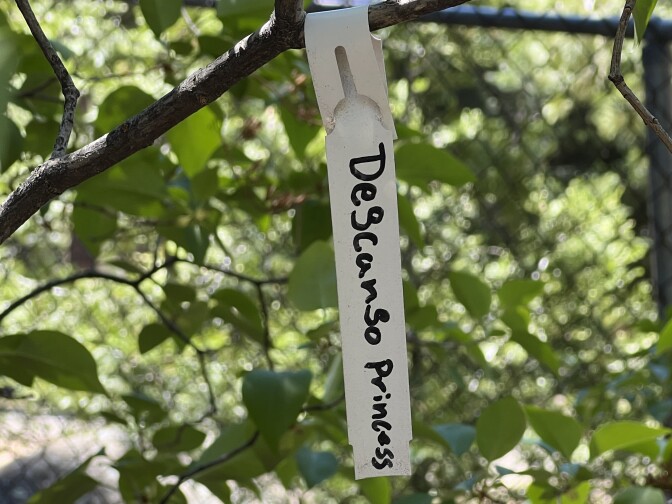This story is free to read because readers choose to support LAist. If you find value in independent local reporting, make a donation to power our newsroom today.
After two decades, one man's obsession with the lilac is coming to an end in Idyllwild

Nestled in the cozy unincorporated Riverside County community of Idyllwild is a haven of sights, sounds and fragrances.
Welcome to the Idyllwild Lilac Garden, some 100 miles east of Los Angeles where thousands of shades between purple and pink glimmer in the sunshine of a garden in peak bloom.
The lilacs may seem simple and small, but among them are surprisingly rare varieties from around the world, all cultivated by one man in his backyard.
It’s the perfect destination for a daytrip out of the city, particularly this year, because owner Gary Parton is selling his property on June 8, which could shutter its gates forever at the end of the blooming season.
Lilac Legacies

Parton was an art teacher for more than 30 years before he retired to his current home in Idyllwild. The 80-something grew up with a green thumb and did landscape design in Palos Verdes while in college, but it wasn’t until 1996, when he met a woman at the Idyllwild gardening club that he learned about lilacs.
“It’s just like painting,” Parton said. “You’re arranging colors, you’re arranging bushes of different sizes, you’re creating paths, you’re determining different areas in your garden.”
That neighbor was Reva Ballreich, who built her own lilac legacy in Idyllwild by establishing a garden with over 800 lilac varieties, which she would open to the public every spring.
Parton has Ballreich to thank for his first ever Lilac plants.
“She gave me much of what I have growing here,” Parton said.
It took five years for his own lilacs to establish, and once they did Parton decided to make his garden free for all to see, too. He’s been at it now for 20 years.
“When I do something I really enjoy sharing it,” Parton said. “It’s like the circle is not complete. Lilacs exist for people and there are people that appreciate them and unless you continue that circle and provide a way for them to see them and relate to them, it’s a half-lost event.”
Lilacs reach across people, space, and even time

The gardener said much of the beauty in lilacs lies in their history. His garden boasts varieties like “Paul Robeson,” named after the American activist and singer, and “Edith Clavell,” that invokes the British nurse who treated German and English soldiers in World War I.
Whoever creates a new Lilac hybridization gets to name it, and a tradition among cultivators has taken hold to name flowers after well-known events in history and admired figures.
Various labels of lilac varieties found in Gary Parton's Idyllwild Lilac Garden.
“ I have maybe seven or eight American presidents. I don't have all the French presidents…when a French president comes into office, someone's working on a lilac that will have his name,” Parton said.
Many of today's Lilac varieties come from French breeder Victor Lemoine, who created 240 varieties from the mid-1800s to the beginning of World War II.
“Colors that never existed, doubles that never existed,” Parton said. “He just blew up those wild flowers…into something that spread all over the planet. And now we have people everywhere growing lilacs”.
Scenes from the path walked at the Idyllwild Lilac Garden.
Families from Los Angeles have frequented the garden for years, according to Parton. Two families of Russian descent in particular find a little bit of home in the flowers.
“They spend the afternoon relating to each other, the very lilacs they remember as children in Russia. So this is real powerful stuff and it stays with people,” Parton said.

Parton’s rare lilacs have attracted international attention — he hosted an International Lilac Society convention in collaboration with the Huntington Botanical Garden a few years ago, where he discovered the significance of his collection.
“Sumerki, which is a lilac about the beautiful color [of twilight], it no longer is being grown in Russia. They discovered no one was growing it. It is extinct in the country that created it," he said of one variety in his garden.
Spreading the suckers

At 86, Parton says maintaining the garden has become too much work. In addition to the daily challenges of upkeep, harsher and harsher winters have started to affect the bloom.
“ It's very difficult for them to adjust to these extreme changes. And the flowers, which are generally very large, become smaller because of the stress that puts them under,” he said.
Parton said many of his rare lilacs have been transferred to Descanso Gardens in La Cañada Flintridge.
“It’s great for me to see the lilacs go on, if I retire and someone doesn’t love this place and love the idea of growing them here,” he said.

Parton’s 20 years of growing lilacs comes to a close in June — the end of this Spring’s lilac blooming season.
He put his home up for sale this month and plans to move to Nevada once his property is sold.
He said he wants to keep gardening, “but something different,” a new flower to dedicate his time to once he’s settled in his new home. However, Parton said lilacs will always hold a special place in his life and he’d like for them to proliferate all over. He quoted the motto of the International Lilac Society, “a lilac in every garden all over the world."

Details
Idyllwild Lilac Garden
Location: 25025 Fern Valley Road, Idyllwild-Pine Cove
Date: Wednesday through Sundays, until June 8
Time: 9 a.m. to 5 p.m.



























